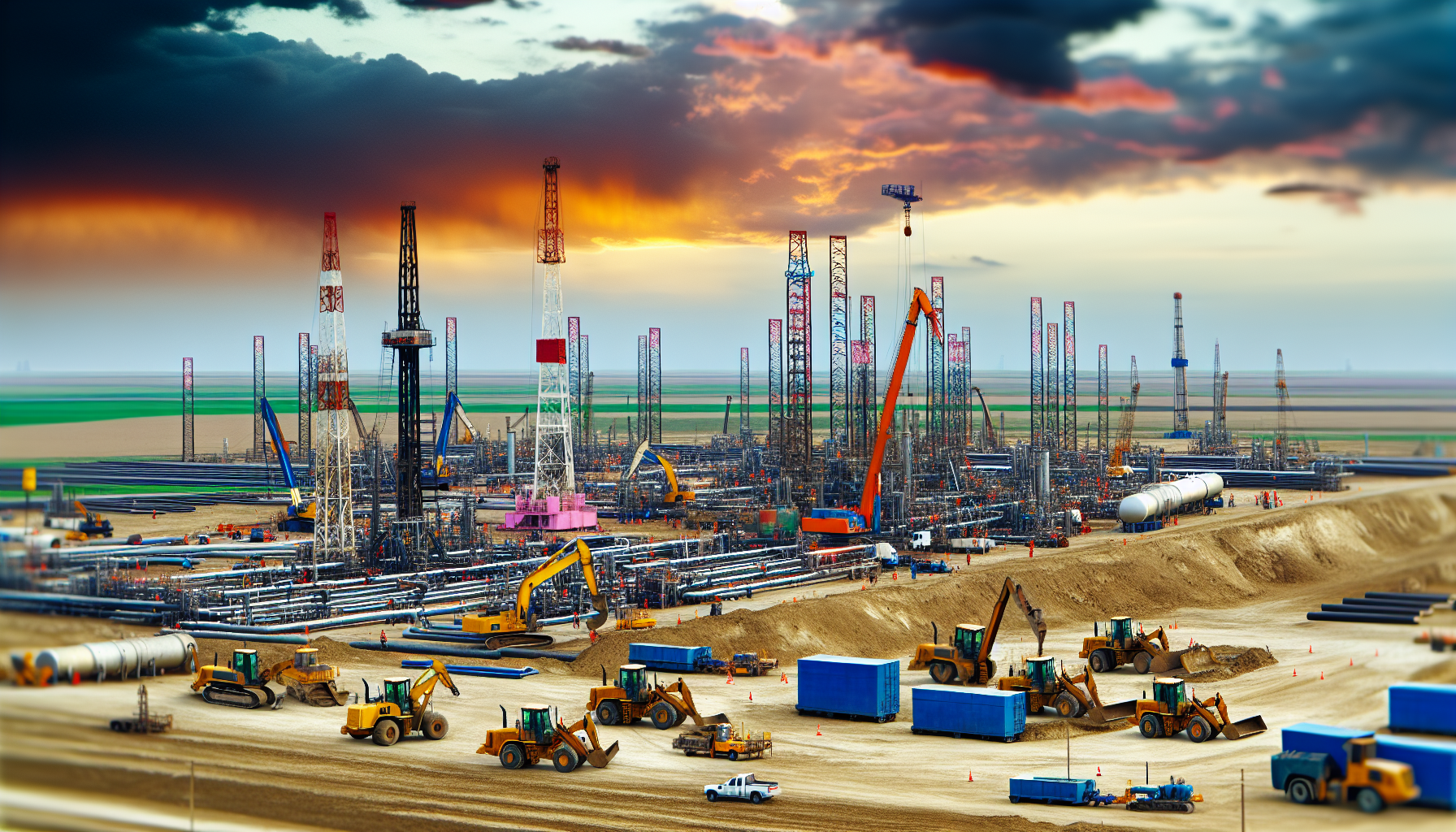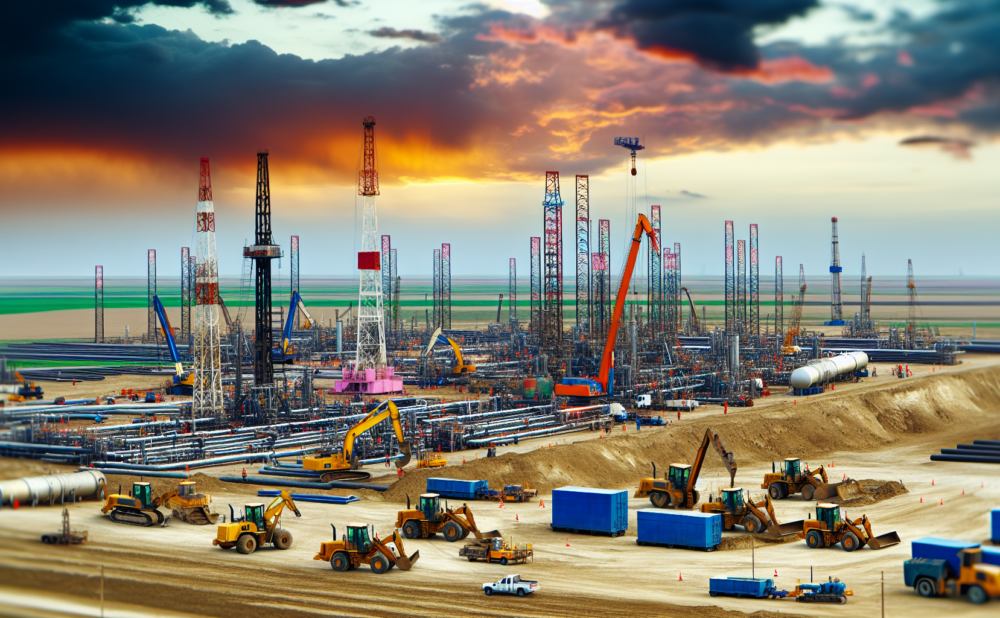Working in the oilfield industry can be rewarding, but it’s not without its risks. Accidents are unfortunately all too common, and the aftermath can be overwhelming. When you’re grappling with injuries, medical bills, and lost wages, it’s vital to enlist an experienced Corpus Christi Oilfield Accident Lawyer who can fight for your rights and ensure you receive the compensation you deserve.
Key Takeaways
-
-
Oilfield accident lawyers are critical in helping workers seek justice and fair compensation after an accident, ensuring oil and gas companies are held responsible for their actions and negligence.
-
-
-
Identifying the frequent causes and types of oilfield accidents is paramount for prevention and illustrates the need for stronger safety measures and comprehensive training to mitigate risks.
-
-
-
When filing an oilfield accident lawsuit, it’s crucial to understand legal options, the importance of expert witness testimonies, the statute of limitations, and selecting a qualified oilfield accident lawyer for adequate representation and compensation.
-
The Crucial Role of Oilfield Accident Lawyers

Dealing with the consequences of an oilfield accident can be overwhelming. Amid the chaos and confusion, one thing remains clear: the need for a competent, experienced oilfield injury lawyer. Oilfield accident attorneys play a pivotal role in helping injured workers seek justice and fair compensation for their injuries. They are the champions of the victims, tirelessly advocating for their rights and holding oil and gas companies accountable.
They employ a variety of strategies to ensure their clients get the justice they deserve. Some of these strategies include:
-
-
Identifying responsible parties
-
-
-
Pursuing litigation when necessary
-
-
-
Providing extensive client services, including administrative assistance and case progress updates
-
-
-
Taking on big oil companies to ensure their clients get the compensation they deserve
-
Oilfield injury lawyers leave no stone unturned in their quest for justice, especially when it comes to oilfield injury claims.
Injured workers often face numerous challenges following an oilfield accident, including companies trying to offer inadequate compensation or imposing restrictive paperwork. Oilfield accident lawyers support these workers by initiating legal proceedings, representing families who have lost a loved one, and negotiating for settlements that cover all relevant damages. They work tirelessly to secure equitable treatment and compensation for their clients.
How Oilfield Accident Lawyers Advocate for Victims
When representing victims of oilfield injuries, oilfield accident attorneys begin their work by conducting a thorough investigation into the accident. This involves:
-
-
Inspecting the accident site
-
-
-
Reviewing safety protocols
-
-
-
Consulting with experts
-
-
-
Analyzing medical records
-
-
-
Interviewing relevant parties
-
They strive to collect all key information and evidence that can reinforce their clients’ cases.
The process of gathering and assessing evidence is meticulous and strategic. Oilfield accident attorneys collect documents, photographs, videos, and witness statements, which they then evaluate in consultation with field experts. This systematic approach ensures a strong case for the victim, significantly increasing the likelihood of receiving fair compensation.
Holding Oil and Gas Companies Accountable
A significant part of an oilfield injury lawyer’s role involves making oil and gas companies answerable for their actions. It’s not uncommon for these companies to neglect their duty of care towards their workers. This negligence can manifest in several ways, including:
-
-
Failure to provide adequate training and supervision
-
-
-
Insufficient maintenance of equipment and machinery
-
-
-
Non-compliance with safety regulations and protocols
-
Oilfield injury attorneys are adept at establishing the negligence of these companies in court. They meticulously present evidence of the company’s failure to adhere to the standard of conduct that protects others from harm, often demonstrating instances of cost-saving shortcuts or deliberate actions that contributed to the accident. They also take into account the comparative negligence regulations in the state to assess the degree of fault. Through these efforts, they ensure that oil and gas companies are held accountable for any negligence that led to an oilfield accident.
Common Causes of Oilfield Accidents

Apprehending the frequent causes of oilfield accidents is key to their prevention. Often, these accidents can be traced back to a lack of safety measures, inadequate training, and equipment failure. Workers in the oil and gas industry face a variety of risks, many of which can be mitigated with proper safety protocols and training.
Inadequate training is particularly problematic, as it can leave workers unprepared to handle the complex and potentially dangerous equipment used in oilfield operations. Equipment failures, often resulting from inadequate maintenance or faulty equipment, create hazardous conditions for workers. All of these factors contribute to the high incidence of oilfield accidents, underscoring the need for rigorous safety measures and comprehensive training programs.
Preventable Accidents and Company Negligence
While oilfield work is inherently risky, many accidents are preventable. Often, these accidents can be traced back to company negligence, including:
-
-
Failure to uphold safety standards
-
-
-
Insufficient training of personnel
-
-
-
Use of faulty equipment
-
-
-
Equipment failures
-
-
-
Explosions and fires
-
-
-
Poorly maintained worksites
-
-
-
Failure to follow safety protocols
-
These avoidable incidents are unfortunately common and can lead to unnecessary harm to oilfield workers.
The consequences of inadequate training are particularly severe. Without proper training, workers may be unaware of safety procedures, lack knowledge on equipment operation, and have insufficient understanding of hazardous materials. Compliance with safety regulations, such as OSHA standards, is vital in preventing accidents and ensuring the safety of workers. Companies that fail to meet these standards must be held accountable for their negligence.
Types of Injuries Sustained in Oilfield Accidents

The types of injuries sustained in oilfield accidents can vary greatly, ranging from minor injuries to serious and fatal injuries. Burn injuries, fractures, and traumatic brain injuries are all common in the oil and gas industry.
Common types of injuries include:
-
-
Burn injuries, which can result from thermal, chemical, electrical, or radiation sources
-
-
-
Fractures, often caused by falls or loss of footing
-
-
-
Traumatic brain injuries, ranging from concussions and skull fractures to instances where objects penetrate the brain
-
-
-
Spinal cord injuries, which can occur due to accidents or other traumatic events
-
Comprehending the possible injuries linked to oilfield work is key, as it highlights the necessity of stringent safety measures and sufficient compensation in case of an accident. Without proper compensation, injured workers may struggle to cover medical bills, deal with lost wages, and cope with the long-term impacts of their injuries. That’s why promptly contacting an oilfield personal injury lawyer is of paramount importance.
Long-Term Consequences of Oilfield Injuries
The long-term consequences of oilfield injuries can be profound and life-altering. Injuries can result in physical disabilities, chronic pain, and reduced mobility, affecting a worker’s daily activities and overall enjoyment of life. Additionally, these injuries can lead to emotional and psychological challenges, including anxiety, depression, and post-traumatic stress disorder.
The financial burden from medical expenses and loss of income can further diminish the quality of life for the injured worker and their family. This underscores the importance of seeking compensation through a personal injury claim or workers’ compensation benefits. With the right legal assistance, injured workers can secure the financial resources they need to cope with their injuries and move forward with their lives.
Navigating the Legal Process: Workers’ Compensation vs. Personal Injury Lawsuits

After an oilfield accident, injured workers typically have two primary legal avenues available: filing a workers’ compensation claim or initiating a personal injury lawsuit. Comprehending the dissimilarities between these two choices is key to determining the optimal course of action.
Workers’ compensation benefits offer limited financial support during the period of work incapacity, but do not include compensation for pain and suffering, physical impairment, or physical disfigurement. They also do not cover 100 percent of past and future lost wages. On the other hand, a personal injury lawsuit can encompass these aspects, in addition to past and future medical expenses.
However, it’s important to note that the choice between a workers’ compensation claim and a personal injury lawsuit isn’t always an either-or decision. In some cases, it’s possible to accept workers’ compensation benefits while also pursuing a third-party liability claim.
Third-Party Liability Claims
A third-party liability claim involves seeking accountability from entities other than the employer for the accident, such as contractors or equipment manufacturers. This type of claim can be filed even if workers’ compensation benefits have been accepted, giving injured workers an additional avenue for compensation.
Third-party liability claims can be particularly beneficial in situations where a third party’s negligence played a role in the accident. These claims may involve compensation for pain and suffering, which isn’t covered by workers’ compensation benefits. However, pursuing a third-party liability claim can be complex, making it crucial to seek legal representation from an experienced oilfield injury lawyer.
Building a Strong Oilfield Accident Case

Constructing a robust oilfield accident case involves a number of significant steps, including:
-
-
Evidence collection
-
-
-
Expert witness consultation
-
-
-
Legal research
-
-
-
Case preparation
-
-
-
Negotiation or litigation
-
An experienced oilfield injury lawyer can guide you through this process, ensuring that all relevant information is collected and presented effectively.
The process of building a strong case for compensation begins with the collection of essential evidence, including:
-
-
Accident reports
-
-
-
Medical records
-
-
-
Witness statements
-
-
-
Any other documentation that can strengthen the claim
-
Expert witnesses can also play a critical role in building a strong case by providing specialized knowledge and testimony. Together, these elements form a compelling argument for compensation, helping to ensure that injured workers receive the financial support they need to recover and move forward.
The Role of Expert Witnesses
Expert witnesses hold a significant role in oilfield accident cases, contributing specialized knowledge and testimony that can reinforce a claim. These witnesses typically have specialized industry knowledge, such as engineers, safety experts, and medical professionals. They offer impartial opinions and credible evidence regarding the cause of the accident, adherence to industry regulations, the severity of injuries sustained, and potential negligence or misconduct.
The testimony of expert witnesses can be instrumental in:
-
-
Proving negligence
-
-
-
Establishing liability
-
-
-
Determining the severity of injuries
-
-
-
Understanding the causes of the accident
-
-
-
Offering safety recommendations
-
In complex cases, the input of expert witnesses can make a significant difference in the outcome of the case, making it crucial to consult with them when building an oilfield accident claim.
Time Limits for Filing an Oilfield Accident Lawsuit
There exist filing deadlines for oilfield accident lawsuits, referred to as the statute of limitations. These time limits vary by state, with most states setting a limit of two to three years from the date of the accident or the discovery of the injury. It’s important to act promptly after an oilfield accident to preserve your rights and ensure you have the opportunity to seek compensation.
However, it’s also important to understand that there can be exceptions to these time limits, depending on the circumstances of the case. If you’re unsure about the statute of limitations for your case, it’s advisable to consult with an experienced oilfield injury lawyer to ensure you don’t miss your opportunity to file a claim.
Exceptions to the Statute of Limitations
While the statute of limitations typically applies, there are certain exceptions that can extend this time limit. For instance, if the injured worker is a minor or mentally incapacitated, the statute of limitations may be extended.
Understanding these exceptions is crucial, as they can significantly impact your ability to seek compensation after an oilfield accident. If you believe an exception may apply to your case, it’s essential to consult with an experienced oilfield injury lawyer to understand your options.
Choosing the Right Oilfield Accident Lawyer
Selecting the appropriate Corpus Christi Oilfield Accident Lawyer is a key step in pursuing a claim following an oilfield accident. With the right lawyer, you can feel confident that your rights will be protected and that you’ll have the best possible chance of receiving fair compensation.
A good Corpus Christi Oilfield Accident Lawyer should have:
-
-
Extensive experience handling oilfield accident cases
-
-
-
A comprehensive understanding of oilfield regulations and safety standards
-
-
-
A demonstrated track record of success
-
-
-
Dedication to advocating for their clients’ rights
-
-
-
Willingness to fight tirelessly for justice and equitable compensation.
-
What to Look for in an Oilfield Accident Lawyer
When choosing an oilfield accident lawyer, it’s important to look for certain characteristics. These include extensive industry experience, a strong track record of successful outcomes, and a client-focused approach.
Additionally, a good oilfield accident lawyer should possess qualifications and certifications that demonstrate their expertise in the field. They should also be transparent about their fees and provide a clear explanation of the services they offer. By considering these factors, you can make an informed choice and select a lawyer who is well-equipped to represent your case.
Summary
In conclusion, navigating the aftermath of an oilfield accident can be complex and daunting. However, with the right legal assistance, injured workers can protect their rights, hold responsible parties accountable, and secure the compensation they need to recover and move forward. Whether you’re pursuing a workers’ compensation claim, a personal injury lawsuit, or a third-party liability claim, having an experienced and dedicated oilfield accident lawyer by your side can make a significant difference in the outcome of your case.
Frequently Asked Questions
What is the role of an oilfield accident lawyer?
An oilfield accident lawyer advocates for injured workers, investigates accidents, gathers evidence, holds companies accountable, and negotiates fair compensation.
What are some common causes of oilfield accidents?
Oilfield accidents and explosions are commonly caused by equipment failures, inadequate training, and company negligence. It is crucial to address these factors to prevent accidents.
What types of injuries can occur in oilfield accidents?
Oilfield accidents can result in a range of injuries, from minor burns and fractures to severe traumatic brain injuries. It’s important to prioritize safety to prevent such incidents.
What are the time limits for filing an oilfield accident lawsuit?
You generally have two to three years from the date of the accident or the discovery of the injury to file an oilfield accident lawsuit, with potential exceptions in specific situations.
What should I look for in an oilfield accident lawyer?
Look for an oilfield accident lawyer with extensive industry experience, a strong track record of successful outcomes, and a client-focused approach. These qualities are crucial for handling your case effectively.
Read more FAQs related to personal injury legal cases.







